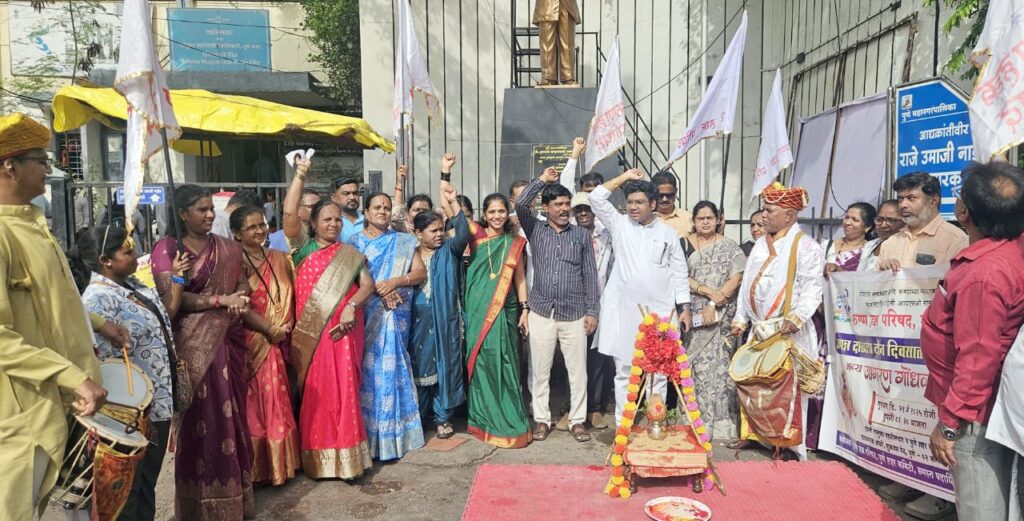Now Reading: Citizens Protest Delays in Income Certificates at Pune Tehsil Offices
-
01
Citizens Protest Delays in Income Certificates at Pune Tehsil Offices
Citizens Protest Delays in Income Certificates at Pune Tehsil Offices

Rugna Hakka Parishad stages unique “Jagran Gondhal” protest for immediate relief
Pune, May 26, 2025: Accusing the Pune City and Haveli tehsil offices of deliberate delays in issuing crucial income certificates, members of the Rugna Hakka Parishad held a dramatic “Jagran Gondhal” protest outside the Mamledar Kacheri on Shivaji Road. The protest aimed to draw attention to the bureaucratic hurdles faced by economically disadvantaged citizens, particularly patients seeking medical aid and students applying for admissions.

The income certificate—an essential document to avail benefits under government health schemes or gain entry into educational institutions—is reportedly being delayed by 20 to 25 days, pushing families into severe distress. In several cases, patients are discharged without being able to claim treatment benefits, while students miss critical admission deadlines due to these delays.
A Spiritual Form of Protest to Wake Up Sleeping Bureaucracy
Led by Rugna Hakka Parishad founder-president Umesh Chavan, the protest took on a unique and symbolic form. The group chose a traditional Maharashtrian “Jagran Gondhal”—a ritual typically performed to awaken divine forces—to metaphorically “awaken the sleeping officials” in the tehsil offices.
Chavan remarked, “This is not just a protest; it’s a cry for justice. Tehsildars in Pune and Haveli seem to be in deep slumber when it comes to issuing income certificates. Our movement today is a spiritual call to wake them up. For over a month, poor citizens have been running from pillar to post while these offices continue to delay important documents.”

Systemic Delays and Exploitation at E-Seva Centers
Chavan also pointed out the irregularities and exploitation at private e-seva centers, where even after collecting arbitrary fees, applicants are forced to wait weeks for their certificates.
“Even when people are willing to pay, the system still fails them. The very schemes meant to protect the poor—like free healthcare or scholarships—become inaccessible due to this bureaucratic lethargy. Families are pawning gold, selling property, and borrowing money just to buy time, yet they are denied what they’re legally entitled to,” he said.
Protest Draws Strong Public Support
The protest saw significant participation from activists, local citizens, and healthcare advocates. Notable attendees included Aparna Marne-Sathe (City President), Kavita Dadar, Prabha Avalelu, Sonali Owhal, Rekha Waghmare, Dr. Yogesh Kadam, Dr. Sunil Salve, Ashish Gandhi, Iqbal Shaikh, and dozens more who stood in solidarity with the affected families.
Many participants shared personal experiences of being unable to avail of government healthcare schemes like Mahatma Jyotiba Phule Jan Arogya Yojana or get timely admissions into colleges due to delayed documentation.
Students and Patients Pay the Price
Every year, hundreds of students from low-income backgrounds rely on income certificates to claim reservation quotas, fee waivers, or hostel accommodations. Similarly, patients admitted under government or charitable schemes are required to submit these certificates at the time of treatment.
“In the absence of timely certificates, students lose their seats. Patients, who should be recovering, are forced into financial ruin. This isn’t just red tape—it’s injustice,” said Rajesh Adsul, one of the protestors.
Demands Put Forth by Rugna Hakka Parishad
The Rugna Hakka Parishad submitted a memorandum demanding:
- Time-bound issuance of income certificates within 7 working days.
- Transparent tracking of application status.
- Regulation of private e-seva centers to prevent arbitrary charges.
- Special counters for emergency medical and education-related cases.
The protestors warned that if their demands are not met, they would escalate their agitation to include statewide demonstrations.
Administrative Response Still Awaited
At the time of reporting, neither the Pune City Tehsildar nor the Haveli Tehsildar had issued an official response to the protest. While a few officials acknowledged the backlog, no concrete assurances were given regarding expediting the certificate issuance process.
The silence from the authorities has only intensified the frustration among citizens who continue to be at the receiving end of bureaucratic delay.
A Wake-Up Call That Cannot Be Ignored
The “Jagran Gondhal” protest might have had a religious tone, but its message was loud and clear—basic services like income certificates should not be a luxury, but a right. As Pune continues to grow into a metropolitan hub, such delays paint a grim picture of governance and accessibility for the underprivileged.
With the academic year nearing and healthcare demands rising, citizens now wait to see whether the administration wakes up to its responsibilities—or whether further unrest lies ahead.
Stay Informed With the Latest & Most Important News
-
 01Sleep Science Shows Why Quality Matters More Than Duration
01Sleep Science Shows Why Quality Matters More Than Duration -
 02Western Maharashtra’s Kirtankars Winning Hearts Through ‘Kon Honar Maharashtra Cha Ladka Kirtankar’
02Western Maharashtra’s Kirtankars Winning Hearts Through ‘Kon Honar Maharashtra Cha Ladka Kirtankar’ -
 03Pune Man Duped of ₹1.35 Lakh in Online Dating Scam: A Cautionary Tale for Digital Romance Seekers
03Pune Man Duped of ₹1.35 Lakh in Online Dating Scam: A Cautionary Tale for Digital Romance Seekers -
 04Mantra Closes ₹1020 Cr Year with New Luxury Brand ‘Burgundy’, Redefines Urban Living in Pune
04Mantra Closes ₹1020 Cr Year with New Luxury Brand ‘Burgundy’, Redefines Urban Living in Pune -
 05Pregnant Woman Dies After Pune Hospital Denies Admission Over ₹10 Lakh Fee, Govt Orders Probe
05Pregnant Woman Dies After Pune Hospital Denies Admission Over ₹10 Lakh Fee, Govt Orders Probe -
 06Pune’s ₹300 Crore Investment Scam: Absconding Couple Traced to Thailand, Police Launch Extradition Efforts
06Pune’s ₹300 Crore Investment Scam: Absconding Couple Traced to Thailand, Police Launch Extradition Efforts -
 07Pune RTO Sets New Benchmark: Earns Record ₹59.36 Crore From Fancy Number Auctions in FY 2024-25
07Pune RTO Sets New Benchmark: Earns Record ₹59.36 Crore From Fancy Number Auctions in FY 2024-25









